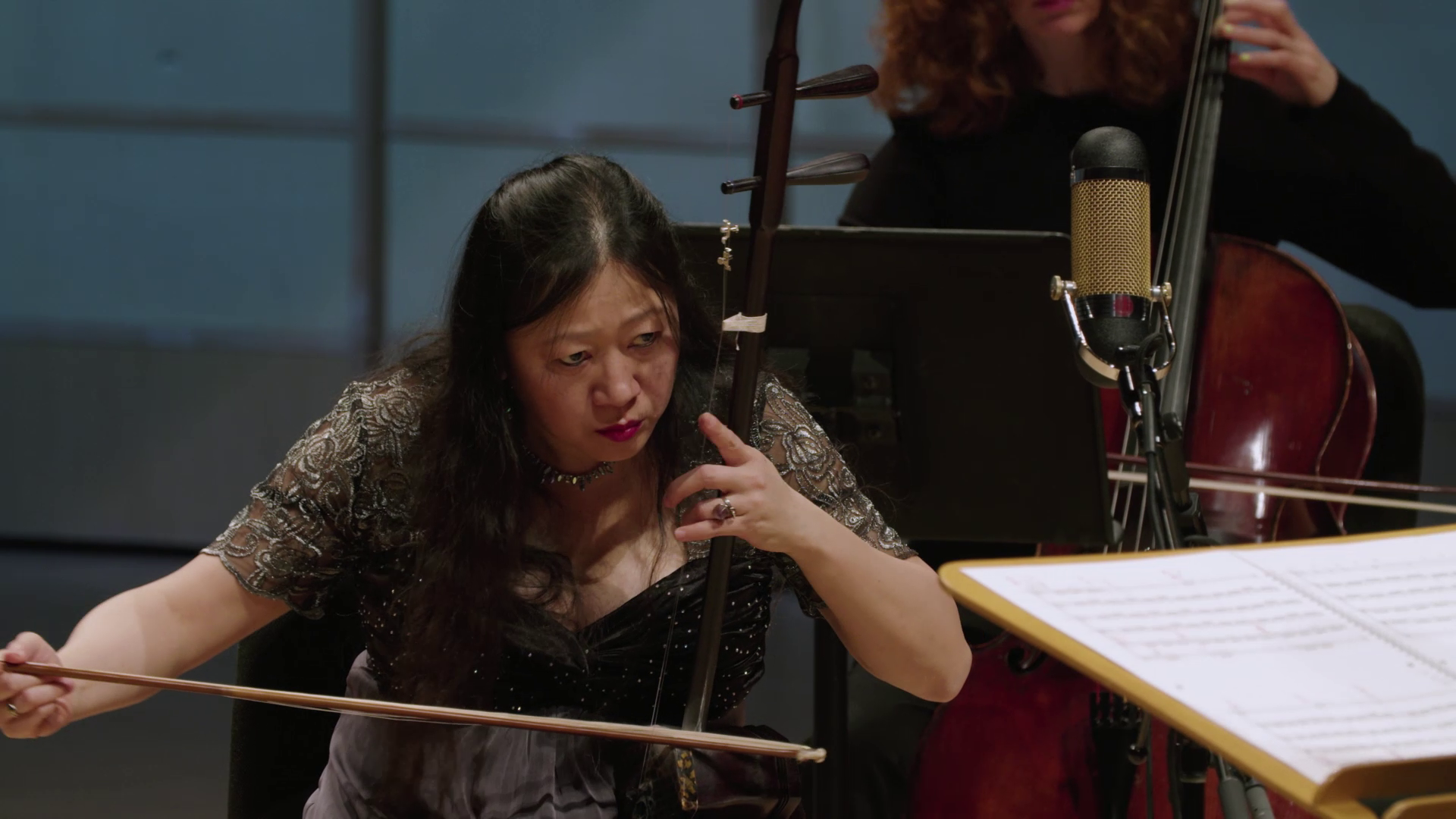Erhu maven Lan Tung bridges East and West, ancient and avant-garde, in new Chan Centre concert
The Vancouver musician headlines an online show featuring members of Turning Point Ensemble, cellist Marina Hasselberg, and world premieres by composer Tim Brady
Lan Tung has been playing erhu since she was in elementary school in Taiwan.
Lan Tung: Have Bow Will Travel premieres on February 26 at 7 pm PST with a virtual watch party and live chat and will be available for viewing until May 31 as part of the Chan Centre’s Spring 2021 Dot Com Series.
LAN TUNG WAS 10 years old when she first picked up the erhu in her native Taiwan. The prolific Vancouver-based instrumentalist and vocalist has gone on to build a body of work that spans genres and generations, incorporating everything from Uyghur influences to avant-garde jazz to improvisation into traditional Chinese music. The Chan Centre for the Performing Arts at the University of British Columbia showcases her musical adventurousness and versatility in a Lan Tung: Have Bow Will Travel.
Premiering on February 26 at 7 pm PST, the concert was recorded over two days in January in the Chan Shun concert Hall at Chan Centre for the Performing Arts at the University of British Columbia. (It will be available for on-demand viewing until May 31; following the premiere is a live artist talk with Tung, composer Tim Brady, and Chan Centre director Pat Carrabré via Zoom.)
The wide-ranging program features two world premieres for erhu and string quintet by composer Tim Brady, joined by musicians from Turning Point Ensemble, as well as performances by Have Bow Will Travel—Tung’s duo with cellist Marina Hasselberg—including an improvisational piece and a traditional Chinese folk song.
“My background is Chinese music, while improvised music is very open,” says Tung, who’s artistic director of Sound of Dragon (which preserves Chinese musical traditions while fusing contemporary applications), a member of Orchid Ensemble, a Juno-nominated trio; and a founder of Proliferasian, where Chinese music and jazz meet in contemporary compositions for improvisers. “It’s a place you can bring different elements. Anything is possible.”
Brady’s two compositions take Tung and other musicians in all sorts of wild sonic directions. Joining her are Turning Point Ensemble’s Owen Underhill (conductor), violinists Marc Destrubé and Mary Sokol Brown, violist Tawnya Popoff, cellist Rebecca Wenham, and David Brown on double bass.
Brady is an electric-guitar virtuoso who has written symphonies for 150 guitars and who also excels in laptop-driven electronic improvisation.
Concerto Étude—a work for erhu, strings, and electric guitar sample—travels from peaceful melodies to pulsing rhythms to dense string textures.
“In Concerto Étude, the electric guitar is really more like a big electroacoustic or electronic texture, like a wall of sound that envelopes and binds together the different elements,” Brady tells Stir. “So it does not really sound like a traditional electric guitar—not quite Led Zeppelin, shall we say. But this was the plan from the beginning: the erhu has the main melodies and ideas, the strings provide the rhythmic and harmonic context, and the ‘electronic’-guitar sounds bridge the musical distance.”
Brady’s Peripheral Visions (an extension of 1984’s Visions), meanwhile, contrasts precisely notated string music with an erhu part that is entirely improvised—Tung is given no hints about what to play and can do anything she wants.
“I have no music, nothing to read in front of me,” Tung says. “I don’t have things in mind beforehand, but the notated structure is very clear and the mood is very clear. It’s a very dramatic piece, so basically, I react to what I hear. There are many options as to how I could respond.”
The idea for Peripheral Visions came to Brady, who’s also an improvisor and the founder of Bradyworks, in 2018. “I woke up one morning and heard this music in my head: a piece for improvising soloist and strings,” he says. “It took me a few days to write it down. I have no idea where this specific idea can from. However, I have written several other pieces with improvisers. It is really just a concerto by another means.
“There is a soloist who is the dramatic focus of the works, and the orchestra—strings--who provide contrast,” Brady says. “In fact, Concerto Étude, where Lan’s part is totally written, and Peripheral Visions, where Lan’s part is totally improvised, really are exploring the same basic idea: soloist versus ensemble.”
Brady says he and Tung had been wanting to collaborate for many years, but the opportunity never arose. “It is strange that the pandemic actually helped make this happen, but sometimes you don’t chose your moments; they chose you,” he says. “Lan is a great player, but she also has a very strong and personal vision about how she sees creative music evolving. I like working with artist who have something to say, and Lan has lots to say with her music.”
Marina Hasselberg (left) and Lan Tung make up the duo Have Bow Will Travel.
Also on the program are three pieces by Have Bow Will Travel: New Year’s Eve by Tian Hua Liu; Gan Sheng Ling (Herding Song), a traditional Chinese folk tune; and an improvisational work.
Tung says she and Hasselberg have performed together numerous times, having developed a sense of familiarity and trust that makes their improvisations a dream. For those who may not be familiar with the sounds of erhu—which she compares to that of a female singing voice—combined with cello, Tung points to Chinese composer Tan Dun’s soundtrack for Ang Lee’s film Crouching Tiger, Hidden Dragon, which features both.
“We decide in the moment what we are going to play,” Tung says. “I’ve played a together lot with Marina and we know each other’s sound and know what things the other likes to play. When you’re playing with someone who’s experienced, you know if you throw something in, it will be picked up. It’s always a fun process.”















